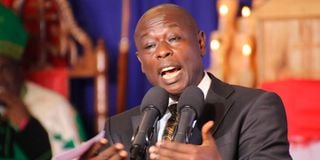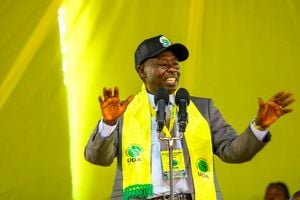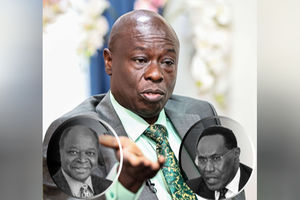
Deputy President Rigathi Gachagua in a past event.
‘I would not allow my Deputy President to be humiliated the way former deputy presidents have been humiliated and the way I have been humiliated.” Those were the words of then-Deputy President William Ruto during an interview in the run-up to the 2022 General Election and at the height of his bitter falling-out with President Uhuru Kenyatta.
Barely two years in office, there are murmurs of a frosty relationship between President Ruto and his deputy, Rigathi Gachagua. Some of Mr Gachagua’s allies have since publicly claimed a scheme to undermine him within the government.
“We (in Mt Kenya) woke up early in the morning… elected both Ruto and Gachagua and suffered a lot in the process. You all know the atrocities committed against Ruto when he was the deputy president and we shall not allow this to happen to our son,” Nyeri Governor Mutahi Kahiga, a close ally of the DP, charged last week.
Political tribulations
But this appears to be the nature of the job. From the first Vice President Jaramogi Oginga Odinga, to other holders of the office like Daniel arap Moi, Prof George Saitoti, Joseph Murumbi, Dr Josephat Karanja and Dr Ruto, all underwent major political tribulations, some initiated by their bosses or power brokers around the presidency.
Some of the holders were later hounded out of office. Mr Gachagua seems to be under attack, mostly from politicians from his own Mt Kenya region, who are perceived to be close allies of President Ruto. They include Kirinyaga Governor Anne Waiguru, Public Service Cabinet Secretary Moses Kuria and Kiharu MP Ndindi Nyoro. The DP has, however, dismissed them as traitors of the region.
“I don’t think the DP position is jinxed. It is just that the position is a job without certainty. That is to say, the DP serves entirely at the pleasure of the President even though they are elected on a joint ticket,” says David Monda, a professor of Political Science at the City University of New York.
“President Moi used the slot to test political winds and keep his allies and rivals guessing. So, Gachagua’s position is no different. He has to ride this storm making contingent plans for his own fall back party, should he become expendable in 2027. Ruto can easily ditch him for another politician,” Prof Monda observes.
Before the 2010 Constitution, the choice of deputy president – then known as Vice President – was largely left to the personal whims of the President. The Head of State could choose to fire and replace at the slightest political disagreement. Currently, the DP position is protected by the constitution, with the two elected on a joint ticket.
This provision has made it difficult for the President to fire, unless through an impeachment by Parliament, but there is no protection from being sidelined from the running of the government. Article 147 states that “The Deputy President shall perform the functions conferred by this Constitution and any other functions of the President as the President may assign.” This makes the position to be like a Minister without a portfolio in the event of a fallout with the President.
Suba South MP Caroli Omondi says a successful partnership between the President and DP depends on the individual character and ideological alignments. “As a cardinal rule, the DP must demonstrate temperance, self-restraint and moderation in the discharge of his duties and offer the President faithful advice but strictly in private. If the two are not ideologically aligned, the DP must defer to the President and clothe himself with an aura of alignment in public even as differences of views are robustly debated in private,” says Mr Omondi.
DNation dropcap: Javas Bigambo, a political analyst, says that the choice of running mate has largely been influenced by the desire to win elections and not convergence of ideology. “In the US, the running mate is picked to fill in the limitations of the candidate. In Kenya, we choose running mates so that they can bring votes to ensure a win. Ruto chose Gachagua because he was perceived to be the only one who could fight Uhuru and deliver the region. The choice is purely on how to win and not how to govern,” says Mr Bigambo.
“Gachagua thought he was a co-president and believed he had a right for equal shares. Because of this, he started flexing his muscles and showing his raw ambitions. He should remember that he has few political ambitions.”
Matching suits
When they got in office in 2013, Dr Ruto and Mr Kenyatta started off with matching suits and ties in a show of bromance, but this changed in their second term in office following a bitter fallout. In the run-up to the last elections, Dr Ruto narrated how he suffered political attacks orchestrated by Mr Kenyatta himself. “Many deputy presidents are fought. It is an unfortunate situation. Given an opportunity, I would not allow my DP to be humiliated the way former deputy presidents have been humiliated and the way I have been humiliated,” said Dr Ruto on April 16, 2021.
“The way I worked with my boss from 2013-2017 is different from the way we have worked from 2017 to now and it is a change of style. From 2013-2017 we worked as a pair and we conducted government business in a manner in which we agreed. I held most of the Cabinet meetings,” he said.
Before they fell out, Jomo Kenyatta and his deputy, Oginga Odinga, used to wear similar beaded beanies although Mr Kenyatta was more flamboyant with his Savile Row suits, a knobbly black walking stick, a silver-handled seigniorial fly whisk, a gigantic golden ring and a gold Omega watch.
Jaramogi was much more at home with his Communist Zhongshan suits and traditional walking stick and fly whisk. The choice of Jaramogi as VP came amidst some misgivings from the exiting colonial government which regarded Jaramogi as too radical. The moment he was picked VP by Kenyatta, pressure on him to quit started. But it was the humiliation that he would later write about.
“On United Nations Day 1965, I was present at the commemorative meeting when a minister appeared to represent the President and to take the salute in the presence of myself as vice-president. Next there was yet another shuffling of my functions as vice- president. Responsibility for elections was removed from my portfolio, and given to a civil servant.”
He would resign. In the resignation letter, Mr Odinga said, “You have not given me any consideration to me as your number 2 in state matters. I have a conscience and this in fact does prick me when I earn public money but with no job to do.”
Joseph Murumbi, who served as the country’s second VP, was hardly two months in the office when his tribulations started. He was appointed in May, 1966, he had by July put in his resignation letter. When the late Moi was seen to be just a step away from becoming President in case Mr Kenyatta died in office, he became the punching bag of powerful individuals from Kiambu.
In his biography written by Andrew Morton, Moi recounted what happened one evening at State House, Nakuru. “(Moi) was deliberately kept waiting by the President’s aide-de-camp, the Rift Valley provincial commissioner Isaiah Mathenge, who allowed numerous groups to call on the President while Moi sat patiently in the waiting room.
Placed roadblocks
When Kenyatta rang through to see who was left, Mathenge replied: ‘There’s only Moi here.’ Then Kenyatta came out and started speaking Kikuyu, a language which Moi follows with difficulty.
In the end, he asked Moi to listen to a choir with him before discussing his business. During the singing, the President dozed off.” In another occasion, wrote Morton, “On at least two occasions, James Mungai (The Rift Valley provincial police commissioner) slapped Moi in the face in front of President Kenyatta at State House, Nakuru.
Moi’s motorcade was regularly stopped and searched by Mungai’s men outside Nakuru as he was returning to his home or to his constituency. Mungai’s men regularly camped near Moi’s farmhouse at Kabarak to monitor his movements, and often placed roadblocks at night on the roads that he would be taking on his way from Nakuru.
Prof Saitoti, who had always thought that he would succeed President Moi, also suffered a similar fate. Prof Saitoti would fall dramatically during a Kanu-NDP merger when he found that his name was missing in the list of vice-chairman the night before.
In his book, Riding on a Tiger, former Vice President Moody Awori writes how Prof Saitoti was humiliated at Kasarani during the party’s National Delegates Conference.
“He (Moi) then announced a merger between Kanu and NDP and the NDP flag was lowered amidst cheers from the 6,000 delegates. He further announced that it had been decided that in the new KANU, the position of National Vice Chairman had been abolished and four Vice Chairmen’s positions created,” says Mr Awori in his book.
“Joseph Kamotho, the Kanu super-hawk and apologist, was treated so despicably that he did not even defend his seat. He called it kichinjio or slaughter house. As a result, Raila was elected unopposed (as Kanu Secretary General). The President was also elected Kanu National Chairman, unopposed.
According to Mr Awori, President Moi reminded Prof Saitoiti that Kanu had “its owners.” Dr Josephat Njuguna Karanja, who served as the country’s fifth Vice President went through a more dramatic fallout with the system. He had replaced Mwai Kibaki and appeared to harbour more than enough ambitions to make some politicians restless.
Power got into Dr Karanja’s head quickly but by the time the Kanu hounds, Kuria Kanyingi and David Mwenje, were set up on him and alleged that he was a “kneel-before-me” politician, and that he was undermining President Moi by working with foreigners, he would make a painful speech that would always be remembered for its poetic manner of delivery.
“The charges levelled against me are totally false and malicious, tendentious and contemptible. I have no intention of defending myself against blatant falsehoods. This is a sad day for our beloved country. Common decency has been thrown out of the window. It has regrettably been replaced by political thuggery and vindictiveness.”
On May 1, 1989, Dr Karanja resigned. The House had passed a well-orchestrated vote of no confidence.







